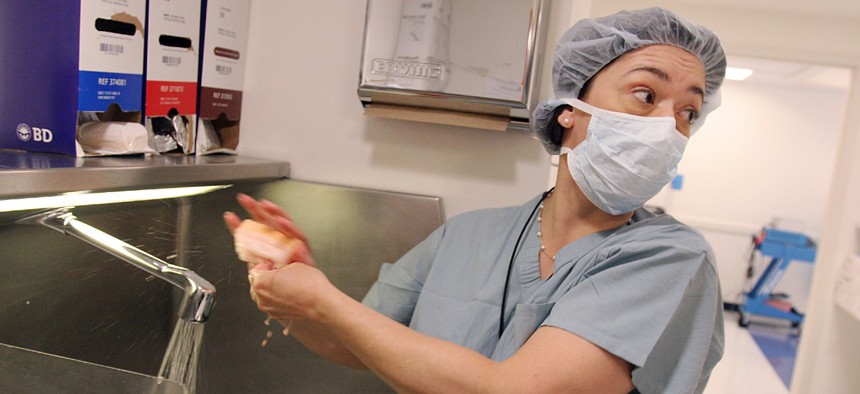
Dr. Monica Bertagnolli prepares for surgery at Brigham and Women's Hospital in June 2007. Angela Rowlings/MediaNews Group/Boston Herald via Getty Images
Biden’s Pick to Lead the Cancer Research Agency Has Been at the Vanguard of Treatment Advances
The president has made ending cancer a main initiative of his administration.
President Biden announced on Wednesday his intent to appoint a prominent surgeon and professor who has been at the vanguard of advances in cancer treatment to lead the federal government’s main agency for cancer research and training.
The president will appoint Dr. Monica Bertagnolli to be director of the National Cancer Institute, part of the National Institutes of Health, which has about 4,300 employees and had a $6.35 billion budget in fiscal 2021. She is currently the Richard E. Wilson professor of surgery in the field of surgical oncology at Harvard Medical School, a surgeon at Brigham and Women’s Hospital, and a member of the Gastrointestinal Cancer and Sarcoma Disease Centers at Dana-Farber Cancer Institute, a top cancer hospital. Bertagnolli will be the first woman to hold this position.
“Throughout her career, Dr. Bertagnolli has been at the forefront of the field of clinical oncology, advancing, in particular, current understanding of the gene that promotes gastrointestinal cancer development,” said an announcement from the White House. “As a physician-scientist, she led gastrointestinal science initiatives from 1994 to 2011 within the [National Cancer Institute]-funded Cancer Cooperative Groups.” She also served as the chief of the division of Surgical Oncology for the Dana-Farber Brigham Cancer Center from 2007 to 2018.
“Over the past five years, Dr. Bertagnolli has championed collaborative initiatives to transform the data infrastructure for clinical research,” the White House continued. Bertagnolli is the founding member of the Minimal Common Oncology Data Elements executive committee (an initiative to improve cancer data quality and sharing). She has also served as president and chair of the board of directors of the American Society of Clinical Oncology, and has served on the American Cancer Society and the Prevent Cancer Foundation’s board of directors.
Xavier Becerra, secretary of the Health and Human Services Department, which houses NIH, said he looks forward to working with Bertagnolli “to advance the president’s call to end cancer as we know it.” She has “decades of cancer research expertise around patient-centered care and her work to create more inclusive clinical trials will be instrumental as we accelerate the rate of research and innovation to fight cancer.”
Tom Misteli, director of the Center for Cancer Research at the National Cancer Institute, tweeted, “all of us [at the center] are very much looking forward to working with Dr. Monica Bertagnolli to continue to bring our unique approach to cancer research to all patients and the cancer community.”
Lawrence Tabak, who is performing the duties of NIH director, congratulated Bertagnolli in a post and thanked Dr. Douglas Lowy for serving as acting director of the National Cancer Institute following the departure of the previous director in April. “Lowy’s willingness to serve in this role on three separate occasions is testament to his unwavering commitment to furthering the mission of [the National Cancer Institute],” Tabak said. Lowy will resume his position as deputy director of the institute now.
For Biden, cancer is a personal issue as he lost his 46-year-old son Beau to brain cancer in 2015 and speaks of him often.
In February, the president restarted the Cancer Moonshot initiative that he launched as vice president in 2016 and set the goal of reducing the death rate from cancer by at least 50% over the next 25 years. He also is seeking to improve the experience for those living with cancer and “end cancer as we know it today.” The president established a Cancer Cabinet as part of the administration's “whole-of-government response.”
Early in his administration, Biden started advocating for the creation of the Advanced Research Projects Agency for Health, within NIH, for biomedical and health research, which was established earlier this year.
The announcement about Bertagnolli came ahead of the president signing into law later on Tuesday the bipartisan Honoring our Promises to Address Comprehensive Toxics (PACT) Act to expand the Veterans Affairs Department's health care services and benefits for veterans who were exposed to burn pits and other toxic substances and are facing illnesses, such as cancer.







